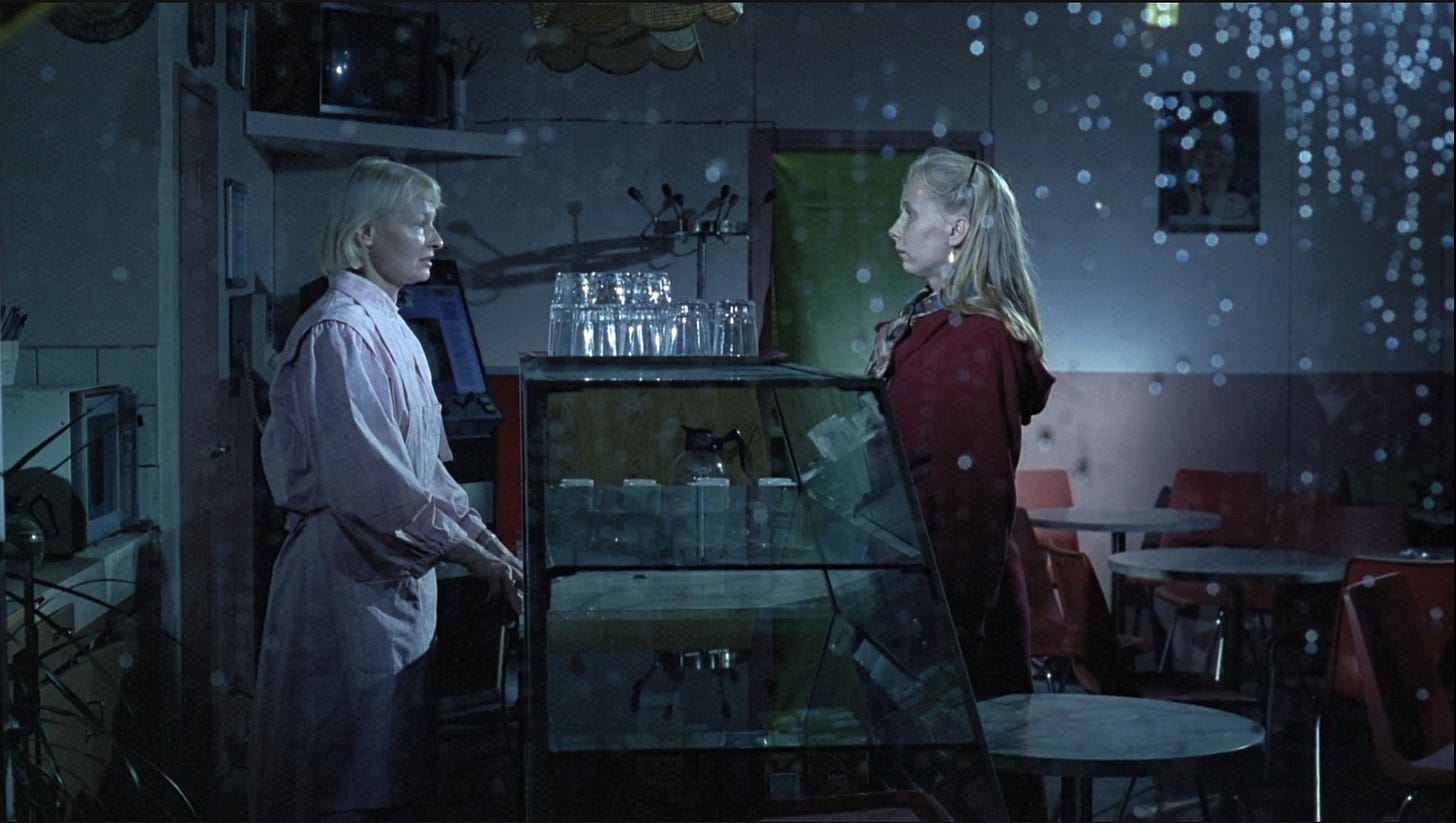Aki Kaurismäki is probably one of the most famous Finnish filmmakers abroad. He also has a brother, Mika, who makes documentaries. But Aki directs fiction movies and is more well-known, having won main prizes in Cannes and being nominated twice for the Oscars in the Best Foreign Language Film category.
His characters are usually blue-collar workers down on their luck, in simple stories about simple conflicts, all told with a sort of dark humour delivered with deadpan seriousness. Far from Hollywood's fake overproduced glamour, his actors are local, average-looking Finns, such as the wonderful Kati Outinen.
In many of his films, people don't talk much, and when they do, it's in a straight-forward, almost abrupt manner. Consider “The Match Factory Girl” (1990), where there is very little dialog, and even the female protagonist barely speaks in the whole movie. You may think this is a style to make it closer to silent movies, but it isn't. It's just Finns being Finns.
Or consider this dialog from another film, “Shadows in Paradise” (1986):
“How much does a single room cost?"
“With breakfast, it's 100.”
“And without breakfast?”
“The same.”
“Okay, I want to book a room.”
“Sorry, we have no rooms left.”
“You should have told me before.”
“Why?”
Before I came to Finland, this sounded like some type of absurdist comedy. But now that I am in Finland, I can see this dialog happening in real life. Not saying that it would necessarily happen, just that it could. Finns tend to dislike small talk and prefer to be straight-forward, even literal in their answers.
There is one scene in that same film where a few characters sit round a table and, unable to say anything to each other, reach our for their pockets and… take out a pack of cigarettes, starting to smoke (today, they would reach for their phones). A foreigner might think that this means that they are feeling uncomfortable with all that silence. But not really. Finns can be comfortable in silence, too.
In some ways it's a relief. Compare it to the American custom of always having a forced smile, of always feeling that you need to say something to your co-workers or even to perfect strangers if you happen to share a corridor or an elevator with them, even if it's just a comment about the weather.
In American restaurants, the waiter or waitress will come every now and then with a smile to interrupt you and ask: “Is everything alright?” This invariably happens when you have just put another piece of hot potato in your mouth and can't answer properly. (But when you actually need anything, the help is nowhere to be found.) Finnish restaurants follow the more appropriate European custom, which is ignoring you and letting you eat in peace until you call them to pay the bill (and no tips).
Migration and Russian relations
Kaurismäki's two most recent movies seem to deal with the subject of migration, so I haven't watched those, as I am afraid it might be just more immigration propaganda (even if, coming from Kaurismäki, I would expect a more nuanced approach, so I might watch them one day). But, in general, it seems to me that old-school leftists like Kaurismäki don't seem to understand that immigration is actually bad for the working class, and a tool of big corporations to reduce salaries and the general quality of life. Just as they don't seem to understand that phenomenons like “transgenderism” are not related to the protection of minorities, but again, tools used by big corporations and other powerful people to further destroy the family and reduce birth rates.
(Whatever the case, it is certainly strange to see old-school leftists pushing exactly the same things that big corporations push.)
Finland, or at least the small towns away from Helsinki, seems to be still relatively homogeneous, even when comparing it to Sweden, which already has 15% of immigrants, and several problems and political division associated with it. Finland does have foreigners, but most of them are neighbouring Russians, Swedes and Estonians (and now, a few Ukrainian refugees, but not as many as in other countries). However, Iraqis and Somalis have increased in the last years since the 2016 engineered “migrant crisis” and are now in fourth and fifth place respectively.
Relations with Russia have become complicated by the current war and the joining of NATO. Well, to be fair, they have been complicated for a long time, as Finland used to be initially part of Sweden, then part of the Russian Empire for almost 200 years, until they managed to obtain their independence thanks in part to the Bolshevik Revolution of 1917 which ended the Russian Empire. The Baltic states were eventually gobbled up by Stalin and the Soviets, but, thanks in part to their victory in the Winter War, Finland wasn't (although they failed in the subsequent Continuation War and lost a small part of their territory to Russia).
So their concern with Russia is understandable, although perhaps it would have been more prudent to wait and see, as Finland wasn't and isn't in any immediate danger. But with the end of the decades-long neutrality and the coming of American military bases, things are probably going to get more complicated again.
Besides Helsinki, most Russians in Finland live in the Karelian region, close to the Russian border. In fact the old historical region of Karelia was divided between Russia and Finland after the Winter War. Finland, today, has two provinces, called South Karelia and North Karelia, and Russia has the Republic of Karelia (even if ethnic Karelians are currently just a small minority there).
In the event of a future conflict between NATO and Russia in Finland, watch out for this region.
Sweden vs Finland
Relations between Finland and Sweden seem to be in general more amicable, as both countries have more in common (and Finns and Swedes have been intermarrying for centuries). Swedish is even the second official language in Finland.
However, it is true that Finland was politically dominated by Sweden for a large part of its history, and, even today, the Swedish-speaking minority in Finland comprise a more upper-class segment compared to Finns in general, a hidden aristocracy, you might say. So there is a certain historical resentment, which can be seen in the fact that Finns love to make jokes about Swedes, and have a great rivalry with them in ice hockey, among other competitions.
The recent victory of Sweden against Finland in the Eurovision contest last Sunday certainly did not help to soothe things.
Note: the Eurovision contest seems to be particularly loved in the Scandinavian countries. I suppose this is because of the victory of ABBA in 1974, which made that band internationally famous. But, for the life of me, besides ABBA (which was kitschy but at least had good and attractive singers), I never saw the appeal of Eurovision. It just seems very trashy to me, the epitome of kitsch and camp, and I never cared for it.
But let's go back and wrap it up with Kaurismäki again, since mentioning music gives me the opening to talk about him again. After all, Kaurismäki movies may sometimes have little dialog, but they do have a lot of music, and in particular Finnish tangos. And while most people of course associate tango with Argentina, Finnish tango — sung in Finnish with a slightly different rhythm — is a very interesting form of “cultural appropriation”, as it has become also a relevant part of Finnish culture. Just watch any Kaurismäki movie and you will see.







Talking about the problem foreign immigration causes to the local population without acknowledging that foreign practices, past and present, by local companies abroad produce the very same phenomenon locals resent is, at best, shortsighted.
Just one example from the many that one could draw from current state of the world: see how tight Finnish government care for Finnish forests while they do not give a dime about South American forests as long as Finnish companies take advantage of them for the pulp and other wood goods.
You are right stating immigration creates havoc into local societies but rejecting it without considering that local people is taking advantages from resources coming from immigrants' land does not consider the issue as a whole.